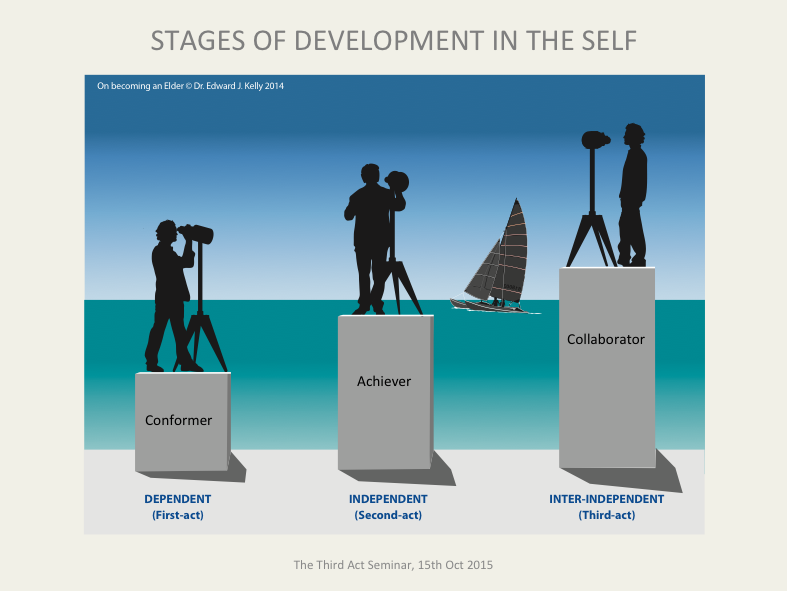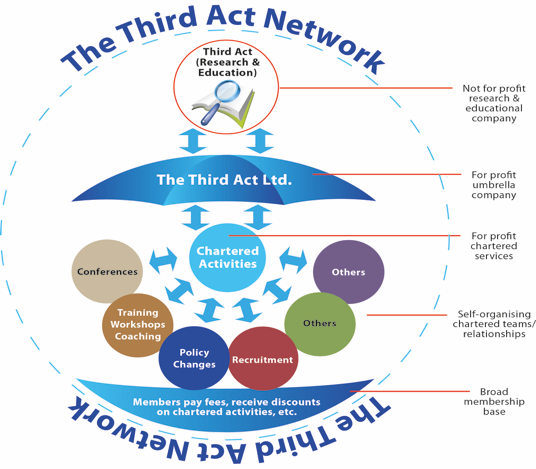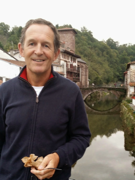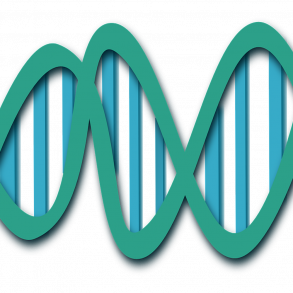By Edward Kelly for Enlivening Edge Magazine
There is an emerging purpose at the heart of The Third Act organisation to both educate people about the impact of human longevity as well as to help them transition from the Second to Third Act in life. This new Third Act arises because of human longevity. We are now living 25-30 years longer than our great-grandparents, the equivalent of a whole new adult lifetime. Many are now referring to this as the new third age or Third Act in life.
There is quite a difference though. “Everyone who lives long enough will have a third age; not everyone who lives long enough will have a Third Act,” we at the organisation say. The third age comes to us from the ‘outside in’ and arises because of improvements in life conditions. We come to The Third Act from the ‘inside out’ and it arises from our capacity to upgrade ourselves to the next stage of human consciousness.
A new organisational design
Responding to this new phenomenon of our time, what organisational design is best suited to support the work of The Third Act as an organisation? Adopting a ‘self-organising and self-managing’ organisational design is entirely appropriate to The Third Act organisation, as like The Third Act itself, it is created from the next stage of human consciousness, i.e., from an Inter-Independent or Teal level. From that platform, our true nature is experienced as intra-connected (in ourselves), inter-connected (to others), and as an integral part of the world around us, each mutually influencing the other. Founded on the principles of ‘self-management, wholeness and evolutionary purpose’, a self-organising and self-managing design marries well with the ‘inside-out’ approach we are taking to The Third Act itself.
How are we getting on?
It is early days yet but so far, adopting a ‘self-organising and self-managing’ organisational design has unleashed a great deal of intrinsic energy, creativity, and innovation. Those participating in The Third Act Organisation are getting used to listening into what the organisation wants to become, to how they can best work together in self-organising teams, and to what responsibility each is prepared to take. This has eliminated much of the usual bureaucracy, management, and control we associate with conventional organisations, but it has also left a kind of vacuum that we are trying to figure out what to do with.
Being part of a learning organisation
As we are finding out, adopting a ‘self-organising and self-managing’ approach doesn’t negate the need for structure, leadership, and management, but it does ‘transcend’ the way we think about how these work. Gone is the conventional hierarchy, and in its place are multiple nested hierarchies of powerful teams aligned by a set of principles, values, and processes that form the architecture of ‘self-organising and self-managing’ systems. And while we have yet to fully understand how this works and to fully embed it in our actions, we are beginning to appreciate that this is what it means to be part of a learning organisation, one that self-reflects and takes action at the same time. This is contrary to conventional organisations who favour action above all else and to inquiry afterwards (in the form of post mortems), which of course is usually too late.
What happens when you take away the conventional leadership, management, and control structures?
In the space left behind, we may get to see how our unconscious assumptions motivate our actions, but before that is the uncomfortable feeling that we don’t know what we are doing, and that we really should revert to the way we have done things before.
And so it goes, “Doesn’t every organisation need a leader with a clear vision of where the organisation is going?” And, “Don’t we need to check that those working in the organisation are doing what they are supposed to be doing?” Conventional organisations start with a plan and then think, “How do we motivate people so we can get the most from them (extrinsic motivation)?” A self-organising approach starts with a question, “How can we create the conditions under which people can motivate themselves (intrinsic motivation)?” This is a significant developmental challenge for all involved.
What areas are we currently operating on?
As described below, we are currently ‘self-organising’ around the following topics:
- creating a template for a Transitional Programme for organisations,
- creating a network of developmental coaches to assist people in their transition from the second to Third Act,
- organising conferences, seminars and workshops – in particular next year’s Third Act conference in April
- health and welfare in The Third Act
- addressing Enterprise, Employment and Purpose in The Third Act.
How do these serve the purpose of The Third Act?
Each serves the purpose of The Third Act in a different way. Having a template for a Third Act Transitional Programme will be useful once people realise that you don’t retire into 25-30 years of life, you transition into it. Also, having a network of qualified Third Act development coaches will be beneficial to those who want more ‘one to one’ support in their transition to The Third Act.
Further, through running conferences, seminars and workshops, we can educate people about the impact of longevity and the difference between being a passive third ager and an active Third Actor. In addition, as we live longer, many will want to continue working; others won’t want to but will have to, and still others won’t need to, but will need to find a new purpose in their Third Act. The Third Act Enterprise and Employment group is addressing some of these issues. There is much to do, so please make contact with us if you feel you could contribute.
Where do we go from here?
We have a sense of the direction in which we want to go, and the underlying purpose we would like to serve, but this continues to emerge as new people come into the organization and new areas of interest arise. It doesn’t seem possible to get it right from the start anyway, and we are losing our need for it to be so. That will also mean we will lose some people along the way, those unable to stay with the discomfort of not knowing.
For those committed to the journey it is intriguing to see how this ‘self-organising, self-managing’ organisational design can assist the work of The Third Act as an organisation. Your comments on what we are doing, what direction we might take this, and whether you would like to be involved, would be welcomed.
REFERENCES
Kegan, R. (1994). In over our heads: The mental demands of modern life. Cambridge, MA: Harvard University Press.
Kelly, Edward (2011). Transformation in meaning-making; selected examples from Warren Buffett’s life. A mixed methods study. Unpublished PhD dissertation.
Kelly, Edward (2015). A Self-organising Systems Approach to Managing The Third Act as an organisation.
Laloux, Frederick (2014). Reinventing Organisations. Nelson Parker; 1st edition (February 20, 2014)
Scharmer, O. & Kaufer, K. (2013). Leading from the Emerging Future: from Ego-system to Eco-system. San Francisco: Berrett-Koehler.
Torbert, W. R., Cook-Greuter, S. R., Fisher, D., Foldy, E., Gauthier, A., Keeley, J., et al. (2004). Action inquiry: The secret of timely and transformational leadership. San Francisco: Berrett-Koehler.
Wilber, K. (2006). Integral spirituality: A startling new role for religion in the modern and postmodern world. Boston, MA: Integral Books.
Dr. Edward Kelly (56) is an entrepreneur, researcher and facilitator. In the past few years he has led over forty workshops in Intel, Accenture, Google, and others. He is a regular presenter on the MBA and Innovation programmes at University College Dublin (UCD) and has published articles on adult development in Integral Leadership Review and in Journal of Integral Theory and Practice. He holds BA, MBA, ITC, and PhD degrees. He can be contacted at: [email protected], on +353 86 810 2000 and at www.thethirdact.ie.
Featured








I’m pleased to have discovered the Third Act Network. I’m in that age group, and I recognise in myself some conflicting ideas relating to “people my age”.
I mix a lot of people who are younger than I am, and sometimes I have the odd experience of meeting a person who I assume is younger than me, and then I find out the person is in fact older than I thought (i.e. closer to my age). Then I’m surprised they don’t fit my idea of “what someone that age is probably like”. Then I realise that I, myself, don’t fit my idea of “what someone that age is probably like” either – and nor does my sister, or my brother… So where do I get this idea about “people that age” i.e. people my age”?
I’ll email [email protected] to find out more.
Pamela. It is interesting that there is little correlation between ‘physical age and stage of psychological development’ and by stage of development here I mean ‘consciousness or awareness’. And perhaps that is because physical age uses an external linear measure of time whereas ‘stage’ of development (which is interior) has no linear measure of time at all. Thus you have some younger people who are aware and appear older (older than their years) and some older people who are aware and appear younger (younger than their years). We tend to focus more on ‘age’ than on ‘stage’. Perhaps Elders, in the traditional sense, were the one group that aligned both.